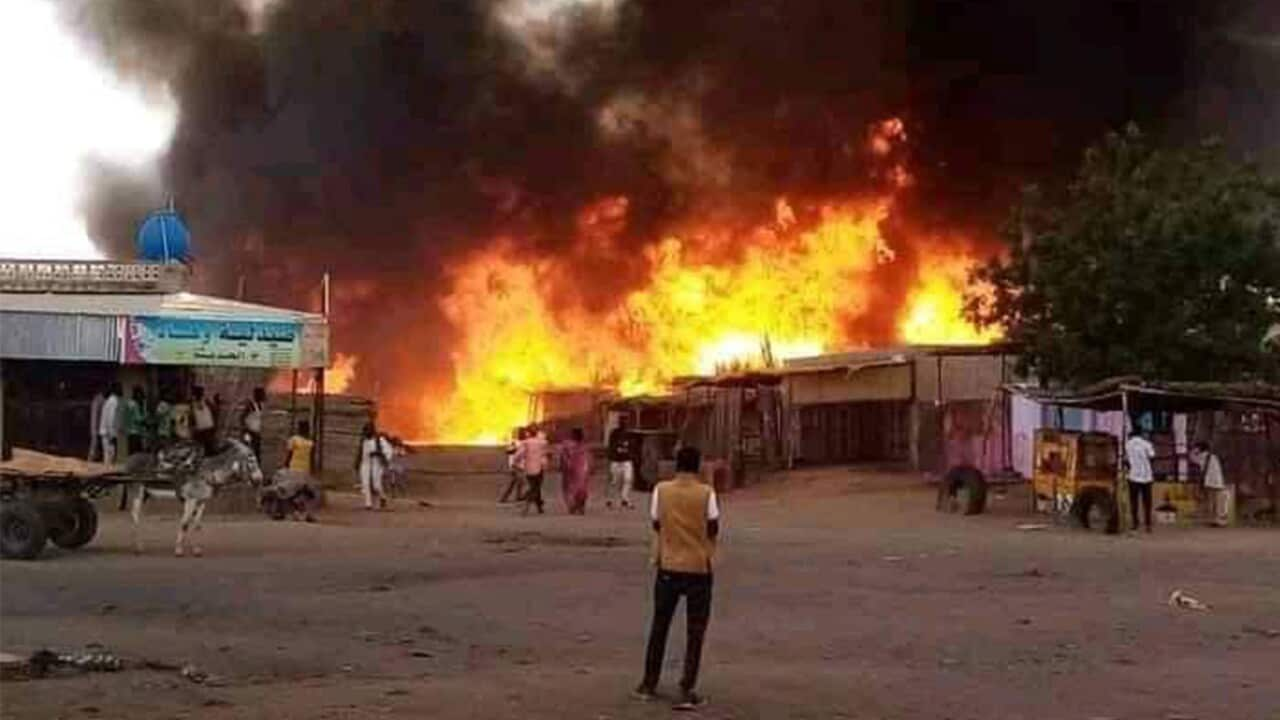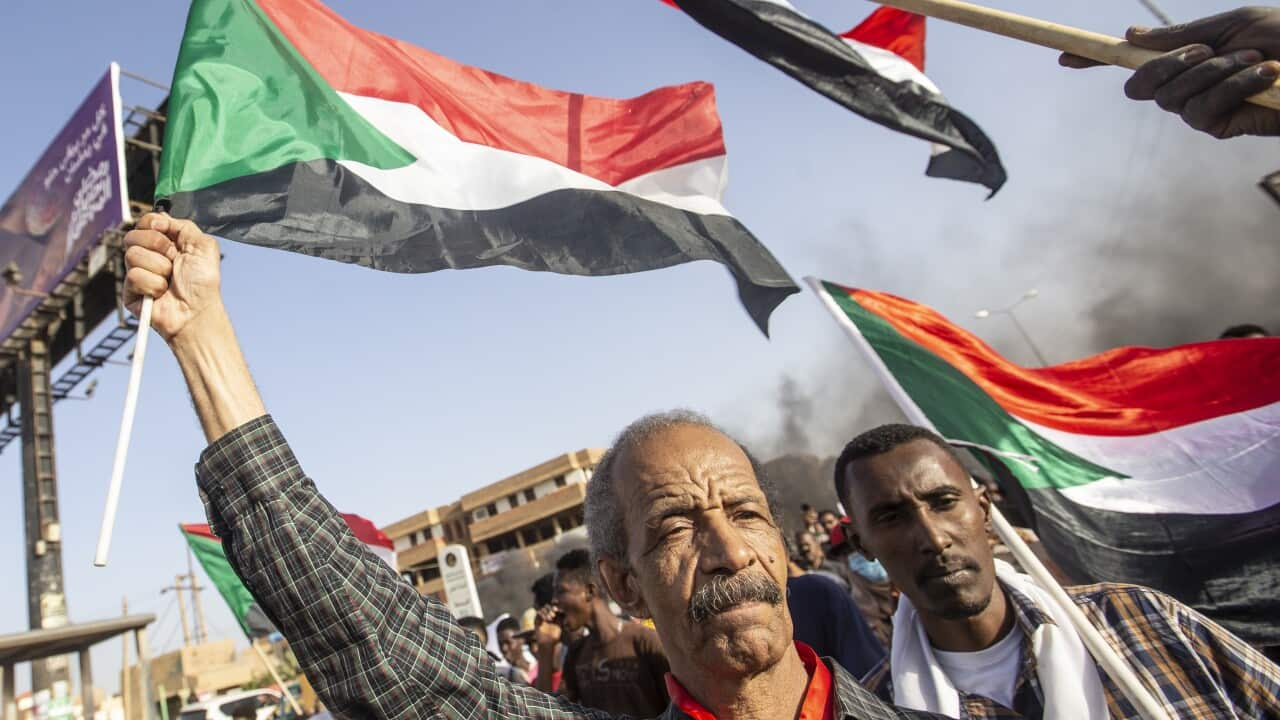Key Points
- Violence erupted in April 2023 between the ruling Sudanese Armed Forces (SAF) and the Rapid Support Forces (RSF).
- More than seven million people have been displaced, and 42 per cent face crisis or worse levels of food insecurity.
- Despite fragile ceasefire talks, the situation on the ground is dire, with near-daily reports of rape and murder.
Omnia Elgunaid can hear the warplanes and shelling from her village in south Al Gezira, Sudan.
"We are living under siege, there is no way to go out," she told SBS News. "We have limited food and lifesaving medicine for chronic diseases are non-existent. No form of healthcare is present."
"We are living with no protection from the army or the security forces – the militia men come and go as they wish, take whatever they want. They've killed many people out of spite in nearby villages."
Elgunaid is describing what the "The Forgotten Crisis," as it warns the Sudanese people continue to face suffering on a scale that is "catastrophic".
It is anything but forgotten for Elgunaid.
"We are now stranded, homeless and helpless," she said. "If left unresolved I know hundreds of thousands will die, including myself."
"This is an SOS."
Elgunaid said she has lost touch with her feelings. "There are no tangible sources of hope."
Elgunaid and her family are among millions of people in Sudan who are directly impacted by the latest iteration of armed conflict to rock the country.
Many on the ground call it a genocide, but leading international bodies have stopped short of using the term.

The World Health Organisation says more than seven million people have been displaced during the conflict. Source: SBS News
What's happening in Sudan?
Violence erupted in April 2023 between the ruling Sudanese Armed Forces (SAF) under General Abdel Fattah al-Burhan and the Rapid Support Forces (RSF), a paramilitary force headed by Mohamed Hamdan Dagalo, who is also known as Hemedti.
The SAF took over after their 2019 coup ousted Omar al-Bashir, who had ruled for 30 years. A second military coup in October 2021 plunged the country into chaos and stalled efforts to establish a civilian-led democratic government.
Now, fighting between the SAF and the RSF has led to mass killings and displacement of millions of people.

Millions of people have been displaced within Sudan or evacuated to neighbouring countries as conflict rages. Source: AAP / Lujain Jo/AP
Almost 25 million people are in need of humanitarian aid, with 42 per cent of the population facing crisis or worse levels of food insecurity.
The World Health Organization says more than seven million people have been displaced, and around 11 million need urgent health aid.
More than 12,000 people have been killed since the latest outbreak of the conflict in April, according to a December .
There have been near-constant reports of the RSF killing civilians, raping women and girls and looting and burning property. Human Rights Watch documenting some of the atrocities.
An illustrates the dangers for civilians caught in the crossfire between the two fighting forces.
"Civilians throughout Sudan are suffering unimaginable horror every single day as the Rapid Support Forces and Sudanese Armed Forces recklessly vie for control of territory," said Agnès Callamard, Amnesty International's Secretary General in the report.
Now, while fragile ceasefire and peace talks take place in neighbouring countries, the situation on the ground remains dire.
#EyesonSudan
Elgunaid is one of many refusing to be silent in the face of systemic violence. She treats her X account like a diary, recording her day-to-day life while being displaced.
"Heavy airstrikes that are shaking the house. It seems like those strikes are nearby, maybe in the neighbouring villages. I hear gunshots and it's getting closer," a post on 8 January reads.
Asadoya is 29 years old, from Sudan and living in Europe. She has been coordinating together with others online to continuously report on what is happening on the ground, doing what they can to keep Sudan, and its people, in the headlines.
"There is a massive failure of the international media community to appropriately cover Sudan and what the population is experiencing," Asadoya told SBS News. "This has led to us civilians being the media of and for Sudan."
On platforms like Instagram, TikTok and X, Asadoya and others are using algorithms to appeal for attention and aid.
Hashtags like #EyesonSudan, #LiberateSudan and #KeepeyesonSudan have been shared thousands of times – on has more than 11 million views.
"We are witnessing mass coverage of what's happening in Sudan through the testimonies, eyes, phones, collective action and words of people in Sudan themselves, for whoever is genuine and truly wants to listen and educate themselves," Asadoya said.
'Their objective is terror'
Yara is sheltering with a friend and their family in eastern Sudan. She also has been documenting her daily life on X.
"The atmosphere is very charged – everyone is ready, bracing for something," she told SBS News. "A lot of men, acquaintances I know are arming themselves, buying a new gun, talking about what they're going to do when the RSF comes."
SBS News has agreed to protect Yara's identity because she fears reprisals for speaking out.
Yara said an influx of people from other parts of Sudan have arrived in the east because of the perception that it is safe.
"There's been a huge increase in security, searches, stops, people in fatigues walking around – young men stopped and questioned," she said, adding that a lot of new arrivals are women on their own with children – forced to leave their men behind to escape the violence.
As a result, the cost of food has skyrocketed, homelessness is rampant and schools and other public buildings have been turned into makeshift shelters.
Her parents fled overseas, but Yara says communication with other family members is few and far between.
"My cousins, some I am in contact with – we can get an occasional call through, but some I haven't spoken to since June, I don't know if they are dead or alive," she said.
'Totally dehumanised'
Yara, Asadoya and Elgunaid all remarked on what they view as minimal coverage of Sudan's plight and a lack of awareness online.
They question why this conflict, the refugees and the scale of suffering are not receiving more support from global governments.
"It's because we're Black. It's because we're African," Yara said. "Everyone thinks we are a monolith, that we don't know how to self-govern, that there is always a coup or a murder spree."
Elgunaid said: "People shrug and brush it off as another 'African struggle.'"
"Many people in the globe just do not care about Sudanese or Sudan, as they only care about issues that directly affect them or are more appealing," Asadoya said.
Yara feels angry "all the time".
"We're the ones who are trapped. No one seems to look past the veneer of an 'African conflict' to see we're the victims – we are totally dehumanised," she said. "I feel sickened, I've lost faith in everything."
"People don't grasp the terror of being in your house and have men come in – total strangers – and being told to hide, thinking this is the day they will come and take you and rape you," Yara said.
"We are alone and it's tragic."
If you or someone you know is impacted by sexual assault, call 1800RESPECT on 1800 737 732, text 0458 737 732, or visit . In an emergency, call 000.



